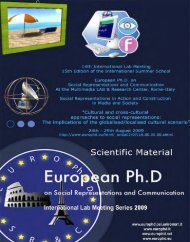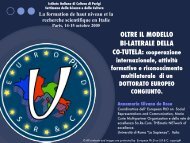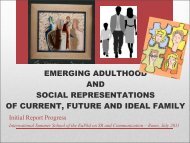The "boomerang" effect of the radicalism in discourse analysis
The "boomerang" effect of the radicalism in discourse analysis
The "boomerang" effect of the radicalism in discourse analysis
You also want an ePaper? Increase the reach of your titles
YUMPU automatically turns print PDFs into web optimized ePapers that Google loves.
potential for contribut<strong>in</strong>g to a social psychology that is critical, rigorous and well-<strong>in</strong>formed about <strong>the</strong><br />
historical,cultural and political contextes that shape human thought and behaviour ”.<br />
(Kruglanski and Jost, 2000, p. 50-51; p. 67)<br />
With<strong>in</strong> a prospect held out to <strong>the</strong> mediation and to <strong>the</strong> <strong>in</strong>tegration <strong>of</strong> <strong>the</strong> prospects,<br />
both considered valid, but with separate aims and levels <strong>of</strong> <strong>analysis</strong> - both on <strong>the</strong> level <strong>of</strong><br />
epistemic assumptions and <strong>of</strong> <strong>the</strong> methodological practices - are set also Mantovani (2000)<br />
and Bonaiuto (1999, 2000).<br />
“<strong>The</strong> cont<strong>in</strong>gent - but surmountable - limits <strong>of</strong> <strong>the</strong> present forms <strong>of</strong> socio-constructionism (SC) consist,<br />
<strong>in</strong> my op<strong>in</strong>ion, <strong>in</strong> <strong>the</strong> radicalisation <strong>of</strong> <strong>the</strong> opposition <strong>of</strong> SC to <strong>the</strong> tradition <strong>of</strong> <strong>the</strong> cognitive sciences and <strong>in</strong><br />
mak<strong>in</strong>g a limited and reducible use <strong>of</strong> <strong>the</strong> potentialities <strong>of</strong>fered by cultural psychology (...). I believe that <strong>the</strong><br />
encounter between SC and <strong>the</strong> recent developments <strong>of</strong> cognitive psychology may not only be possible but<br />
also pr<strong>of</strong>itable for both.<br />
<strong>The</strong> methodological question: to set quantitative and qualitative aga<strong>in</strong>st each o<strong>the</strong>r seems to me a very<br />
crude way <strong>of</strong> settl<strong>in</strong>g <strong>the</strong> problem. <strong>The</strong>re are diverse levels <strong>of</strong> <strong>analysis</strong> and diverse objects <strong>of</strong> <strong>analysis</strong> and<br />
diverse contexts <strong>of</strong> research (...). SC will consider <strong>the</strong> <strong>the</strong>oretical assumptions (and <strong>the</strong> methodologies) <strong>of</strong> <strong>the</strong><br />
current psychological research as "one" <strong>of</strong> <strong>the</strong> possible arguments (not as an <strong>in</strong>valid argument, except for its<br />
claims to exclusivity)"<br />
(Mantovani, 2000, p. 124-125)<br />
As a matter <strong>of</strong> fact, <strong>the</strong>re is a tendency to underscore <strong>the</strong> importance <strong>of</strong> <strong>the</strong>se two preferential<br />
associations (cognitive-quantitative and constructionist-qualitative) and to reduce consequently <strong>the</strong> difference<br />
between <strong>the</strong> two approaches to a difference essentially <strong>of</strong> methodological practices (...). It is, <strong>in</strong>stead, <strong>the</strong><br />
<strong>in</strong>tention <strong>of</strong> this contribution to support and briefly describe how <strong>the</strong> crucial difference is not so much <strong>in</strong> <strong>the</strong><br />
type <strong>of</strong> method as such, nor <strong>in</strong> <strong>the</strong> more or less prom<strong>in</strong>ent role that <strong>the</strong> qualitative method assumes with<strong>in</strong><br />
each approach, but ra<strong>the</strong>r <strong>in</strong> <strong>the</strong> purposes with which it is used <strong>in</strong> each approach (...): Whereas <strong>the</strong> qualitative<br />
technique <strong>of</strong> <strong>the</strong> focus group is used traditionally for <strong>the</strong> purpose <strong>of</strong> mak<strong>in</strong>g <strong>the</strong> phenomena considered<br />
<strong>in</strong>dividual and stabile emerge, <strong>in</strong> an approach <strong>of</strong> socio-constructionist type, such as that <strong>of</strong> discursive<br />
psychology, <strong>the</strong> same technique is used for <strong>the</strong> purpose <strong>of</strong> br<strong>in</strong>g<strong>in</strong>g to <strong>the</strong> surface <strong>the</strong> way <strong>in</strong> which <strong>the</strong>se<br />
supposed <strong>in</strong>dividual and stable phenomena are <strong>the</strong> outcome <strong>of</strong> negotiations among <strong>the</strong> speakers and <strong>of</strong> <strong>the</strong><br />
specific rhetoric-discursive strategies used by <strong>the</strong> conductor <strong>of</strong> <strong>the</strong> <strong>in</strong>terview.<br />
(Bonaiuto, 2000, p. 122-123)<br />
If <strong>the</strong> criticisms addressed to <strong>the</strong> ma<strong>in</strong>stream <strong>of</strong> experimental psychology played a role<br />
<strong>in</strong> some way <strong>in</strong> found<strong>in</strong>g socio-constructionism, less foreseeable, less expected and perhaps<br />
less justified (if not for <strong>the</strong> rhetorical artifice <strong>of</strong> legitimis<strong>in</strong>g a scientific terra<strong>in</strong> built on<br />
<strong>the</strong> difference) were <strong>the</strong> criticisms directed to those paradigms <strong>of</strong> social psychology (<strong>in</strong><br />
particular to <strong>the</strong> <strong>the</strong>ory <strong>of</strong> social representations) that - with various decades <strong>in</strong> advance -<br />
had taken a critical role vis-à-vis cognitive social psychology and its methodological<br />
<strong>in</strong>dividualism.<br />
We have already been observed elsewhere (de Rosa, 1994, p. 278) that criticisms <strong>of</strong><br />
SR <strong>the</strong>ory come primarily from <strong>the</strong> Anglo-Saxon world, where psycho-social research is<br />
more tightly anchored to experimental microparadigms and is less open to <strong>the</strong><br />
<strong>in</strong>terdiscipl<strong>in</strong>ary approaches which, <strong>in</strong> France, characterize social psychology as a sister <strong>of</strong><br />
sociology and cultural anthropology. However <strong>the</strong>se criticisms do not <strong>of</strong>ten come from <strong>the</strong><br />
“aficionados” <strong>of</strong> <strong>the</strong> various alternative paradigms which can be traced to <strong>the</strong> U.S. brand <strong>of</strong><br />
social cognition. Researchers from <strong>the</strong>se traditions usually take one <strong>of</strong> two positions: ei<strong>the</strong>r<br />
<strong>the</strong>y completely ignore <strong>the</strong> <strong>the</strong>ory - despite <strong>the</strong> availability <strong>of</strong> English translations <strong>of</strong> many<br />
<strong>of</strong> <strong>the</strong> most important <strong>the</strong>oretical works and empirical research on SR - or <strong>the</strong>y show<br />
5














